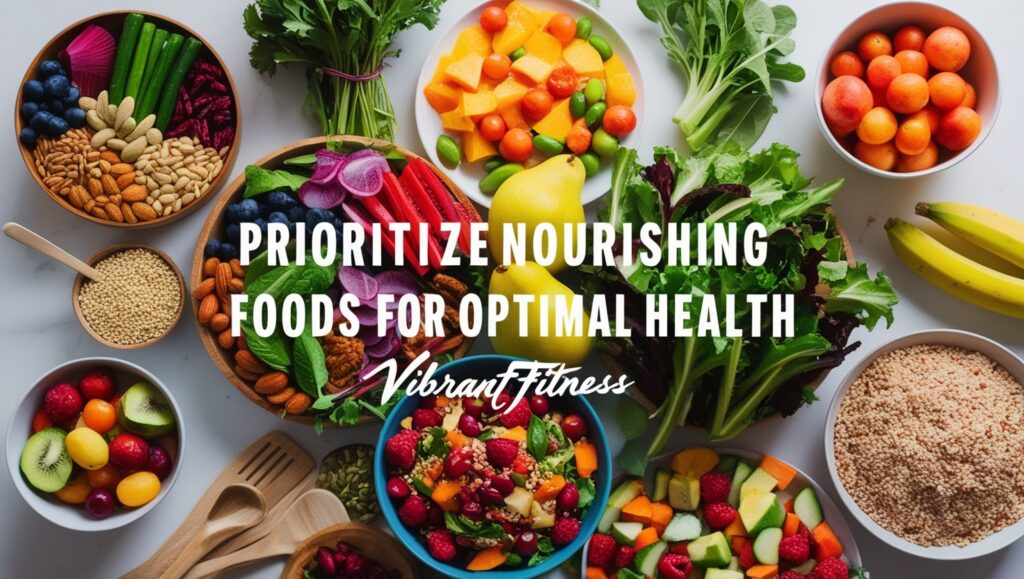Transform Your Life: Essential Lifestyle Changes for Success

Effective lifestyle changes include regular exercise, a balanced diet rich in fruits and vegetables, proper hydration, sufficient sleep, stress management techniques like meditation or yoga, limiting alcohol intake, and avoiding smoking. These changes can significantly improve overall health and well-being.
What are some effective lifestyle changes for improving overall health?

Key Highlights
- By making changes to live healthier, you can boost how good you feel and cut down on the chances of getting things like heart disease. Key moves include eating better, staying active regularly, and getting enough sleep.
- Eating well, keeping up with physical activity, and finding ways to handle stress are all key to better overall health.
- It’s smart to start with small goals that are easy to reach so that you can keep improving over time without giving up.
- Adding these healthy habits into your life can make a big difference. You’ll end up feeling happier and more energetic.
Introduction
In our busy lives today, it’s super easy to fall into bad habits and forget about taking care of ourselves. But if you try out a few important changes in how you live, your life can turn around for the better. You’ll feel healthier physically and see improvements in your mood and overall happiness, making every day better. These healthy lifestyle changes, when implemented one at a time, can have a transformative effect on your life.
It’s really important to understand why changing our lifestyle matters so much. The decisions we make each day about what we eat, how much we move around, and dealing with stress play a big role in our health. By noticing when things aren’t going great and deciding to do something about it, we’re already on the path to feeling awesome.
In this blog post, I’m excited to talk about seven key changes that could seriously make a difference in your health journey. We’re looking at eating right with a healthy diet; moving more through regular physical activity; staying positive; getting enough rest; and making behavior change a priority in your life. These are just some ways that can help shift things towards the positive side of life.
Understanding the Need for Lifestyle Changes
Changing how you live isn’t just about trying out new health fads or getting into a short-term fitness craze. It’s about taking charge of your well-being and choosing habits that will help you in the long run. If you don’t look after yourself, big problems like high blood pressure, being overweight, and the risk of heart disease can sneak up on you. By putting your health first and tweaking how you live day-to-day, you can cut down the chances of these serious issues cropping up and make sure your quality of life is as good as it gets.
Recognizing the Signs That It’s Time for a Change
Paying attention to certain signs can tell you when it’s time for a lifestyle change. When you’re always tired, not having much fun, or dealing with bad relationships, these could be clues that your habits aren’t helping your health. By making small tweaks in your daily routine and fixing those unhealthy behaviors, you start moving towards a healthier way of living. Recognizing these signals and being ready for change is the first step on this path to feeling better overall.
The Impact of Lifestyle on Well-being
The choices you make every day matter when it comes to your health. Living a healthy lifestyle can do wonders for your body, mind, and feelings. With things like eating well, staying active regularly, and finding ways to chill out and handle stress better, you’re setting yourself up for top-notch overall health and the release of endorphins. These good habits are key not just for keeping fit but also in making sure your brain is sharp and emotions stay steady – giving you this great sense of being balanced and satisfied with life. By looking after yourself properly through these positive routines, you’ll feel more alive than ever before.
Essential Lifestyle Changes for Enhanced Health
To get better health and feel happier, it’s really important to make some changes in how we live. This means eating well, staying active often, and keeping our weight at a good level. All these things are linked together and are super important for making us healthier overall. Eating the right foods gives our body what it needs to work best while being active helps keep our weight where it should be and is great for heart health too. By incorporating essential lifestyle changes for enhanced health, such as proper nutrition, you’re taking big steps towards being healthier and feeling better.
Prioritize Nourishing Foods for Optimal Health
To boost your overall health, it’s really important to focus on eating foods that are good for you. A healthy diet filled with foods packed with nutrients gives you all the vitamins, minerals, and antioxidants your body needs. Here’s a rundown of some food groups you should make sure to eat:

- With whole grains like brown rice, quinoa, and whole wheat bread in your meals, you get lots of fiber which keeps energy levels steady.
- Adding low-fat dairy products such as milk, yogurt, and cheese helps give your body calcium and protein.
- Eating different kinds of fruits and vegetables adds a bunch of necessary nutrients because they come in so many colors.
- For essential amino acids that our bodies need but can’t make on their own; chicken fish beans tofu
- Lean proteins from things like chicken,
- fish,
- beans, and tofu are key.
Including sources
of healthy fats – think avocados nuts olive oil
like avocados, nuts, and olive oil is great for keeping your heart in shape. By making these nourishing items a big part of what you eat, you’re helping ensure your body gets healthy.
Incorporate Regular Physical Activity into Your Routine
Staying active is key to a healthy life. It’s not just about keeping your weight in check; it also makes your heart healthier, builds strong muscles and bones, and boosts how good you feel overall. Here are some tips on getting more activity into your day:
- For around 150 minutes each week, do things that get your heart rate up like fast walking, biking, or swimming.
- Work on building stronger muscles and denser bones by doing exercises like lifting weights twice every week.
- Try simple changes to make moving part of what you do every day. Use the stairs instead of an elevator, park a bit further from where you’re going or take quick walks when you have a break.
Putting regular physical activity high on your list and finding fun ways to keep moving can bring lots of health benefits into your life.
Cultivating a Positive Mindset
Besides looking after your body, taking care of your mind and feelings is key to a happy life. It’s really important to keep a positive way of thinking if you want to feel good overall. When you get better at handling stress and start seeing the glass half full, it makes you stronger inside. With letting go of bad vibes and paying more attention to being thankful and kinder to yourself, getting through tough times becomes simpler. Putting your mental health first and staying optimistic can truly change how you live, bringing more joy into every day.
Embrace Mindfulness and Meditation Practices
Mindfulness and meditation are essential practices for stress management and overall well-being. These methods teach you how to stay in the moment, pay attention on purpose, and not be hard on yourself for what you’re thinking or feeling. By making mindfulness and meditation part of your daily routine, you can lower your stress levels, get better at focusing, think more clearly, and improve how happy you feel inside. If you keep it up regularly, these practices will help bring a sense of calmness into your life that makes dealing with tough times easier. Embracing mindfulness and meditation is a crucial step in transforming your life and achieving success in stress management.
The Role of Positive Thinking in Transforming Your Life
Thinking positively is important if you want to change your life. The way we think affects what happens around us and how we act. When you start thinking more positively and turn those negative thoughts into something better, it changes how you see things. This kind of mindset can help you get through tough times, make choices that are good for your health, and pick up new habits that make your life better overall. With an eye on the good stuff happening around us, we can spread positivity everywhere in our lives. By welcoming positive thoughts into our day-to-day routine, not only do we transform our own experiences but also pave the way for a happier existence.
Improving Sleep Quality
Getting good sleep is super important for your overall health. When you don’t get enough shut-eye, it can mess with both your body and mind, making you tired, less sharp, and more likely to get sick over time. To feel your best, focusing on restful sleep and addressing any lack of sleep matters a lot. By sticking to a regular bedtime routine and keeping things consistent, you’re setting yourself up for better zzz’s. Making sure where you sleep is comfy and calming down before hitting the pillow can help big time in getting that deep, healing kind of rest.

Tips for Achieving Restful Sleep Every Night
To get a good night’s sleep, it’s key to have some healthy sleeping habits and make sure your bedroom is just right for sleeping. Here are ways you can sleep better:
- By sticking to the same bedtime and wake-up time every day, you help your body know when it’s time to sleep.
- With activities like reading or taking a warm bath before bed, you can wind down and get ready for sleep.
- Keeping your room cool, dark, and quiet makes it easier to fall asleep and stay asleep.
- Staying away from things that keep you awake late at night, like phones or computers helps because they give off blue light which can mess with your ability to fall asleep.
- Cutting back on caffeine drinks like coffee or tea in the evening as well as alcohol since both of them could throw off how well we rest.
By following these suggestions focused on getting restful sleep, keeping up with a regular sleep schedule, and having calming routines around bedtime, waking up feeling great each morning becomes much more likely.
Understanding the Link Between Sleep and Health
The connection between getting enough sleep and staying healthy is really important. When you get good, restful sleep, it helps keep your body and mind in top shape. Not sleeping enough can lead to serious issues like high blood pressure, heart disease, becoming overweight, and even diabetes. On the flip side, making sure you get plenty of quality shut-eye supports your immune system to work better; it keeps your brain sharp and helps manage how you feel emotionally. By putting a focus on getting good sleep every day as part of your routine, you’re doing something great for your overall health while also lowering the chance of running into these big health problems.
Effective Time Management Strategies
Managing your time well is super important if you want to keep a healthy lifestyle. It’s all about finding the right balance between work, personal stuff, and taking care of yourself. With some good planning and figuring out what needs to come first, you can cut down on stress, get more done, and have extra time for things that make you feel good. By sticking to a daily routine and setting doable goals, along with sorting out your tasks by importance, you’ll be able to use your time in the best way possible. Adding these smart ways of managing time into how you live can help bring everything into harmony and leave you feeling more satisfied with life.

Organizing Your Day for Maximum Productivity
Having a well-planned daily routine can boost how much you get done and keep you zeroed in on your objectives. It’s all about managing your time wisely to squeeze the most out of every day. To kick things off, aim for small wins by setting goals that are within reach and have clear deadlines. This approach not only keeps up your drive but also brings a rewarding feeling with each task you tick off. Additionally, organizing your day with fun activities related to your goals can help you stay motivated and on track. Create a structured schedule that incorporates enjoyable tasks to keep you focused and excited about your goals.
To make time management smoother, think about using some handy tools or methods. For instance, jotting down what needs to be done in a planner or digital calendar helps organize tasks and meetings efficiently while reminders can prevent those important deadlines from slipping through the cracks. Tackling big projects gets easier too when you break them into smaller chunks.
By shaping up your day with priority-based planning, it becomes possible to steadily advance towards achieving what matters most without dropping the ball on having a balanced life between work and play. However, staying adaptable is key; don’t hesitate to tweak your schedule so it always aligns with what’s currently top of mind for you.
Tools and Techniques for Efficient Time Use
Besides setting up your day, there are a bunch of handy tools and tricks that can help you use your time wisely. With time-tracking apps, you get to see exactly where your time goes and figure out how to tweak things for better productivity. Then there’s the Pomodoro Technique, which is all about working hard in short bursts and then taking quick breaks. It’s great for keeping your focus sharp and stopping burnout before it starts.
On top of these, task management apps or software are super useful too. They let you make lists of what needs doing, remind you about them, and keep track of how much progress you’re making. These kinds of tools keep everything organized so that finishing tasks on schedule becomes easier.
Focusing on what matters most first is key as well; it keeps you from feeling swamped by too many tasks at once. By leaning into these helpful strategies and gadgets, boosting your productivity while managing time effectively becomes a whole lot simpler.
Building and Maintaining Healthy Relationships
Having good relationships is important for feeling happy and healthy. Being around people who care about you, like friends, family, or even the folks you work with can make a big difference. They help cheer you up when you’re down, listen to your problems which makes stress go away, and help keep your mind in a good place.

To keep these relationships strong, it’s all about talking openly, listening well to each other, and treating everyone with kindness. Make sure to catch up with the people close to you often; doing fun stuff together or just being there when they need someone shows that you care. Putting effort into these connections regularly not only keeps them strong but also plays a huge part in making life more joyful.
The Importance of Supportive Social Connections
Having people around who support you is important for keeping your mind and overall health in good shape. Whether it’s family, friends, or even the people you work with, having folks to lean on can make you feel like you belong, lift your spirits when times are tough, and help understand what you’re going through. These connections can lower stress levels, make us feel better about ou,rselves and give us a helping hand as we face life’s ups and downs.
On top of that, being surrounded by supportive people isn’t just good for our mental well-being; it also does wonders for our physical health. Research has found that those who have strong networks of support tend to get sick less often with things like heart disease compared to those who don’t have this kind of backing.
So it makes sense why we should put time into growing these relationships. Try spending quality moments with the ones close to your heart doing fun stuff together or simply talking openly without holding back anything. Being around positive-minded individuals not only boosts how happy we feel but significantly improves our overall health too.
Strategies for Nurturing Positive Relationships
To keep your relationships strong and positive, you need to put in some work and mean it. Here’s how you can do that:
- Communication: Talking openly and honestly is super important. Listen well when someone else is talking, share what’s on your mind kindly, and try to understand where they’re coming from.
- Quality time: Spend real time together doing things both of you enjoy. Whether it’s going out or picking up a shared hobby, these moments make your connection stronger.
- Support: Always be there for the people you care about, whether times are good or tough. Help them out when needed and cheer them on.
- Boundaries: It’s okay to tell others what works for us; setting clear boundaries helps everyone feel respected.
- Conflict resolution: Arguments happen but dealing with disagreements calmly can help solve problems without hurting feelings.
By following these tips, we can build healthier relationships that make our lives better overall.
Reducing Alcohol Consumption
Cutting down on drinking is a good step towards improving your health. Drinking too much can cause a bunch of problems like liver issues, putting on weight, and raising your blood pressure. Since drinks are packed with calories, they can make you gain extra pounds.
By taking a close look at how often and how much you drink, you might see if it’s messing with reaching your health goals. Being honest about this can help figure out if it’s time to drink less or maybe get advice from someone who knows about dealing with alcohol use.
- With lifestyle changes, cutting back on booze could boost your well-being.
- Considering the link between heavy drinking and health problems such as obesity and liver damage shows why moderation matters.
- Alcohol being loaded with calories explains its role in weight gain challenges.
- The connection between excessive drinking and increased blood pressure highlights another reason to reassess alcohol intake for better heart health.
Assessing Your Drinking Habits
Taking a good look at how much and how often you drink alcohol is a key step if you’re thinking about drinking less. It’s really important to be honest with yourself about your drinking patterns and see if it’s affecting your overall health or happiness.

Start by looking at how much, how often, and under what situations you’re drinking. Think about whether you tend to drink more than what’s generally advised or if drinking is getting in the way of your everyday activities, relationships, or duties. Also, think about any negative effects on your health that might be linked to how much alcohol you consume.
If it turns out that your habits around drinking aren’t great for your health or are causing problems, then it might be time for a change. Getting help from a friend, coworker, or family member who knows a lot about dealing with issues related to using substances too much can make cutting back easier. Joining a group where people support each other in living without so much alcohol can also do wonders for leading a healthier lifestyle.
Practical Tips for Cutting Down on Alcohol
Cutting back on drinking might seem tough, but it’s doable with some smart moves. Here are a few tips to help you drink less:
- Make clear plans: Decide how many days each week you’ll skip alcohol or limit the number of drinks you’ll allow yourself.
- Look for other drinks: Try out tasty non-alcoholic options like mocktails, herbal teas, or flavored waters that you enjoy.
- Drink wisely: Pay attention to how much you’re pouring and sip your drink slowly. Try having a non-alcoholic drink between alcoholic ones to pace yourself.
- Get support: Think about joining a support group or talking to someone who specializes in helping people with their drinking habits. They can offer motivation and keep you on track.
- Stay away from temptations: Figure out what makes you want to drink and avoid those situations. Instead, find different things to do that don’t involve alcohol.
- Keep health in mind: Remember the bad effects too much alcohol can have on your body, like adding extra calories and causing inflammation.
By following these steps, cutting down on your drinking becomes more manageable as part of moving toward a healthier lifestyle
Developing a Self-care Routine
Creating a self-care routine is key to keeping your life in balance and staying healthy. It’s all about making sure you do things on purpose to look after your body, mind, and feelings. This could mean working out, finding ways to relax, enjoying hobbies or hanging out with family and friends. When you make self-care part of every day, it helps you handle stress better, boosts how good you feel overall, and keeps burnout at bay.
Identifying Self-care Practices That Work for You
Finding the right self-care practices for you is crucial in setting up a routine that lasts. Since everyone’s different, what helps one person might not help another. It’s all about discovering activities that make you feel happy, calm, and overall good.

Looking into things that match your interests and values, like diving into hobbies, enjoying nature walks, sitting quietly with meditation or just taking time out to relax can be beneficial. Making these activities part of your routine is key.
It’s essential to remember that self-care isn’t selfish at all; it plays a big role in keeping up your physical and emotional health. By figuring out which self-care habits fit best with you, you’re on your way to supporting your well-being fully.
Incorporating Self-care into Your Daily Life
To make self-care a part of your everyday life, you’ve got to treat it like it’s really important and work on forming new habits. Begin with figuring out the best times during your day for some self-care moments. This could be early in the morning before everything kicks off, smack dab in the middle of your lunch break, or late at night just before you hit the hay.
By weaving these self-care activities into what you do every day through reminders or a set schedule, consistency becomes easier. It makes sure that taking care of yourself isn’t something that happens once in a blue moon but is instead a staple part of your daily routine.
With an open mind towards trying different things for self-care and seeing which ones fit best with what brings you happiness and relaxation, this journey can lead to not only prioritizing your well-being but also living a life that feels more rewarding and healthy overall.
Conclusion
To wrap things up, changing some key parts of your daily routine can make a big difference in how good you feel and the quality of your life. By choosing to eat better, making sure you get regular physical activity, keeping a positive outlook, getting enough sleep, managing your time well, having healthy relationships with others around you not drinking too much alcohol, and taking some time for yourself now and then are all ways that help put you on the path to being healthier. When we start doing these things more often it’s amazing how much more energy we have or clearer our thoughts become. We also find ourselves bouncing back from tough times easier than before which makes us feel happier overall about where life is heading. It’s true what they say: even small changes here and there can lead to big improvements over time so why not start today? Take that first step towards feeling better both inside and out!
Frequently Asked Questions
How Do I Begin Making Lifestyle Changes?
Starting to make changes in your lifestyle might seem like a big deal at first. However, the trick is to focus on small goals. With that in mind, pick one change you’re aiming for and split it into smaller, easier steps. For help along the way, consider joining a support group or talking to a healthcare professional. By doing this and making sure your new habit becomes part of your daily routine, you’ll find it much more manageable.






